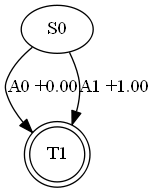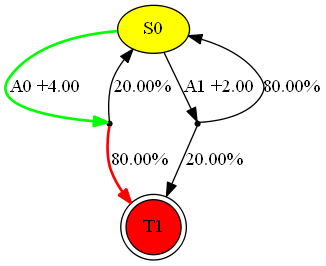This Python framework makes it very easy to specify simple MDPs.
To install using pip, use:
pip install blackhc.mdp
To run the tests, use:
python setup.py test
A whitepaper is available at https://arxiv.org/abs/1709.09069. Here is a BibTeX entry that you can use in publications (or download CITE_ME.bib):
@techreport{blackhc.mdp,
Author = {Andreas Kirsch},
Title = {MDP environments for the OpenAI Gym},
Year = {2017},
Url = {https://arxiv.org/abs/1709.09069}
}
In reinforcement learning, agents learn to maximize accumulated rewards from an environment that they can interact with by observing and taking actions. Usually, these environments satisfy a Markov property and are treated as Markov Decision Processes (MDPs).
The OpenAI Gym is a standardized and open framework that provides many different environments to train agents against through a simple API.
Even the simplest of these environments already has a level of complexity that is interesting for research but can make it hard to track down bugs. However, the gym provides four very simple environments that are useful for testing. The gym.envs.debugging package contains a one-round environment with deterministic rewards and one with non-deterministic rewards, and a two-round environment with deterministic rewards and another one with non-deterministic rewards.
The author has found these environments very useful for smoke-testing code changes.
This Python framework makes it very easy to specify simple MDPs like the ones described above in an extensible way. With it, one can validate that agents converge correctly as well as examine other properties.
MDPs are Markov processes that are augmented with a reward function and discount factor. An MDP can be fully specified by a tuple of:
- a finite set of states,
- a finite set of actions,
- a matrix that specifies probabilities of transitions to a new state for a given a state and action,
- a reward function that specifies the reward for a given action taken in a certain state, and
- a discount rate.
The reward function can be either deterministic, or it can be a probability distribution.
Within this framework, MDPs can be specified in Python using a simple domain-specific language (DSL).
For example, the one-round deterministic environment defined in gym.envs.debugging.one_round_deterministic_reward could be specified as follows:
from blackhc.mdp import dsl
start = dsl.state()
end = dsl.terminal_state()
action_0 = dsl.action()
action_1 = dsl.action()
start & (action_0 | action_1) > end
start & action_1 > dsl.reward(1.)The DSL is based on the following grammar (using EBNF[@ebnf]):
TRANSITION ::= STATE '&' ACTION '>' OUTCOME
OUTCOME ::= (REWARD | STATE) ['*' WEIGHT]
ALTERNATIVES ::= ALTERNATIVE ('|' ALTERNATIVE)*
See below for how alternatives work. Alternatives can be used in place of states, actions and outcomes, and comprise of states, actions and outcomes.
For a given state and action, outcomes can be specified. Outcomes are state transitions or rewards. If multiple state transitions or rewards are specified for the same state and action, the MDP is non-deterministic and the state transition (or reward) are determined using a categorical distribution. By default, each outcome is weighted uniformly, except if specified otherwise by either having duplicate transitions or by using an explicit weight factor.
For example, to specify that a state receives a reward of +1 or -1 with equal probability and does not change states with probability 3/4 and only transitions to the next state with probability 1/4, we could write:
state & action > dsl.reward(-1.) | dsl.reward(1.)
state & action > state * 3 | next_stateAlternatives are distributive with respect to both conjunctions (&) and outcome mappings (>), so:
(a | b) & (c | d) > (e | f) ===
(a & c > e) | (a & c > f) | (a & d > e) |
(a & d > f) | (b & c > e) | ...
Alternatives can consist of states, actions, outcomes, conjunctions or partial transitions. For example, the following are valid alternatives:
stateA & actionA | stateB & actionB
(actionA > stateC) | (actionB > stateD)
As the DSL is implemented within Python, operator overloading is used to implement the semantics. Operator precedence is favorable as * has higher precedence than &, which has higher precedence than |, which has higher precedence than >. This allows for a natural formulation of transitions.
The framework also supports specifying an MDP using a conventional API as DSLs are not always preferred.
from blackhc import mdp
spec = mdp.MDPSpec()
start = spec.state('start')
end = spec.state('end', terminal_state=True)
action_0 = spec.action()
action_1 = spec.action()
spec.transition(start, action_0, mdp.NextState(end))
spec.transition(start, action_1, mdp.NextState(end))
spec.transition(start, action_1, mdp.Reward(1))To make debugging easier, MDPs can be converted to networkx graphs and rendered using pydotplus and GraphViz.
from blackhc import mdp
from blackhc.mdp import example
spec = example.ONE_ROUND_DMDP
spec_graph = spec.to_graph()
spec_png = mdp.graph_to_png(spec_graph)
mdp.display_mdp(spec)The framework also contains a small module that can compute the optimal value functions using linear programming.
from blackhc.mdp import lp
from blackhc.mdp import example
solver = lp.LinearProgramming(example.ONE_ROUND_DMDP)
print(solver.compute_q_table())
print(solver.compute_v_vector())An environment that is compatible with the OpenAI Gym can be created easily by using the to_env() method. It supports rendering into Jupyter notebooks, as RGB array for storing videos, and as png byte data.
from blackhc import mdp
from blackhc.mdp import example
env = example.MULTI_ROUND_NMDP.to_env()
env.reset()
env.render()
is_done = False
while not is_done:
state, reward, is_done, _ = env.step(env.action_space.sample())
env.render()The blackhc.mdp.example package provides 5 MDPs. Four of them match the ones in gym.envs.debugging, and the fifth one is depicted in figure 2.

